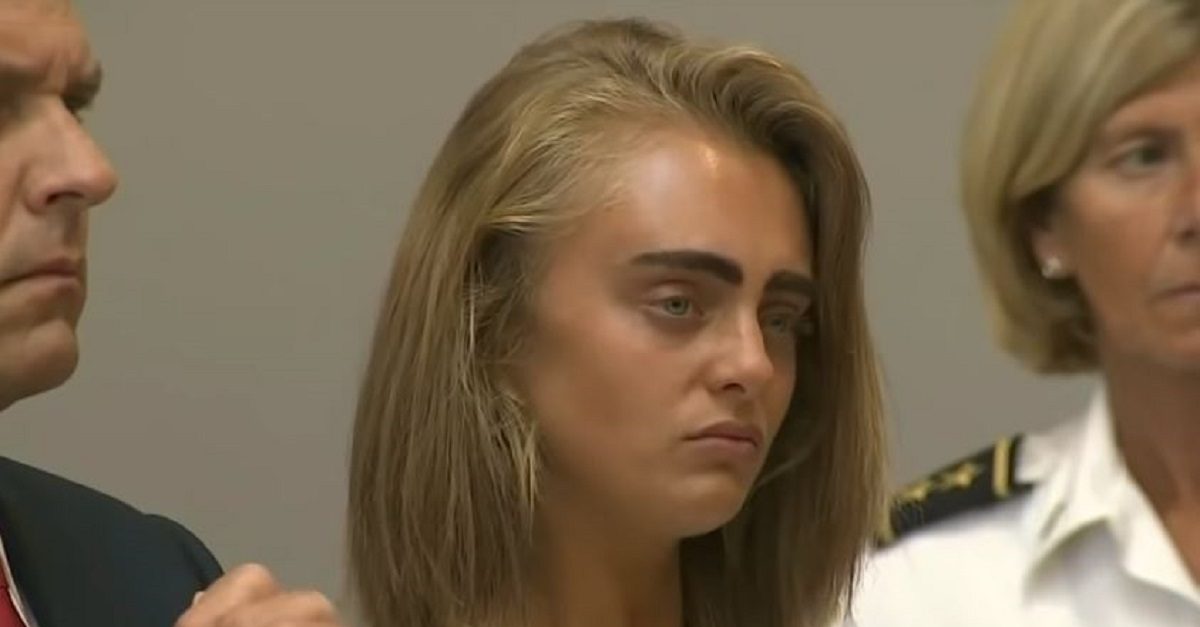
On Monday, Michelle Carter learned that her attempt to get the Supreme Court of the United States to review her involuntary manslaughter conviction in the suicide of Conrad Roy III was not successful. On the same day, however, authorities confirmed Carter would get out of prison early.
Per Boston 25 News:
Carter is set to be released from jail on January 23, a spokesperson for the Bristol County Sheriff’s Department confirmed to Boston 25 News on Monday afternoon. Inmates over at the Bristol County House of Corrections – where Carter is serving time – are able to earn time for good behavior.
“There have been no problems and she has been attending programs, which is common at state facilities like the Bristol County House of Correction,” said Jonathan Darling, the spokesperson for the Bristol County Sheriff’s Department.
If not for the early release, Carter would have been behind bars until May 2020.
Carter was convicted in June 2017 for repeatedly encouraging Roy over text messages to kill himself. Carter was 17 years old at the time, while Roy was 18. Roy took his own life on July 12, 2014 by carbon monoxide poisoning. Texts from Carter like these made national news:
“Well, I guess [that I am frustrated] just because you always say you are gonna do it but you don’t, but last night I know you really wanted to do it and I’m not mad.”
“Well, I mean, kind of, I guess, just because you always say you’re gonna do it… but you don’t but last night I knew you really wanted to and I’m not mad.”
“You’re not joking about this or bullshitting me, right? I just want to make sure you’re being serious. Like I know you are, but I don’t know. You always say you’re gonna do it, but you never do. I just want to make sure tonight is the real thing.”
“Conrad. I told you I’ll take care of your family. Everyone will take care of them to make sure they won’t be alone and people will help them get thru it. We talked about this, they will be okay and accept it. People who commit suicide don’t think this much and they just do it.”
Carter had appealed to the the highest court in Massachusetts and that appeal was heard back in October 2018. Those messages were deemed so “wanton or reckless” that Carter’s involuntary manslaughter conviction was upheld.
“Her conviction of involuntary manslaughter as a youthful offender is not legally or constitutionally infirm. The judgment is therefore affirmed,” that court determined. Carter was sentenced to 15 months in prison.
In Sept. 2019, Carter got some bad news, when an attempt to get out of prison early failed.
Even though the Bristol County Sheriff’s Office reportedly described her as a “model inmate” shortly after she started serving time in Feb. 2019, the parole board was clearly still concerned. The parole board decision noted it was troubling that Carter “not only encouraged [Conrad Roy III] to take his own life, she actively prevented others from intervening in his suicide.” Furthermore, the board said, Carter’s “self-serving statements and behavior, leading up to and after his suicide, appear to be irrational and lacked sincerity.”

Bristol County Sheriff’s Office
Also in Feb. 2019, Carter’s attorneys said that they were going to ask the Supreme Court of the United States to overturn her conviction. SCOTUS declined to hear the case on Monday.
Carter’s attorneys wanted SCOTUS to settle whether it is constitutionally protected free speech to encourage another person to commit suicide. In their SCOTUS petition, Carter’s lawyers argued that her conviction violated both the First and Fifth Amendments.
After the SCOTUS news came down, Carter’s attorney Joseph Cataldo maintained that his client’s conviction was “unprecedented” and dangerous.
“Clearly many legal scholars and many in the legal community understand the dangers created by the unprecedented decisions of the Massachusetts courts,” he said.
[Image via ABC screengrab]
Have a tip we should know? [email protected]